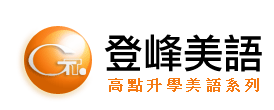文章分類
最新文章
熱門文章
|
|
|||||||||||||||||||||||||||||||||||
| How to Use ‘Will V’ | |||||||||||||||||||||||||||||||||||
| 2015/01/27 | |||||||||||||||||||||||||||||||||||
The best way to think about ‘will V’ is this: It’s used in set-phrases with I or you to express a variety of different meanings or functions, such as saying goodbye (I’ll see you later.) making promises (I’ll call you back.) making offers (I’ll help you with the figures.) making requests (Will you help me with the figures?) making warnings (You’ll hurt yourself! Be careful!) or threats (I’ll hit you if say that again!) or expressing spontaneous decisions (I’ll go by myself), which is how David uses it in the conversation from last week.
‘Will’ does not mean, however - and it’s important to be really clear about this- is this: ‘will’ does NOT mean a future arrangement or plan.
Task 1: Sort these set-phrases for ‘will’ into the table below.
----------------------------------------------------------------------------------------------------
*2015/01/30更新
Here are the answers from last week.
*You may have found this very hard. That’s because it’s very often very difficult to know what these set-phrases with ‘I will’ or ‘you will’ mean without knowing more about the surrounding conversation and situation. In real life, however, when you know more about the context and situation, it will be easier to understand the meaning.
*For example, I could say ‘I’ll be in touch’ as a promise or as a way of saying goodbye. ‘I’ll get it’ could be a promise or an offer depending on the situation.
*‘I’ll give you a ring’ means ‘I’ll call you’. It doesn’t mean ‘let’s get married!’
*‘I’ll drop you a line’ means ‘I’ll write to you’.
*‘I’ll put the kettle on’ means ‘I’ll boil some water and make some tea.’
*Threats always begin with I, while warnings always begin with you. Threats are usually humorous and are not to be taken (or used) seriously. If you really want to threaten to kill someone, don’t tell anyone you learnt the set-phrase from me!
*One thing to be clear about however, is that these set-phrases are NOT used for describing plans or arrangements.
*If you look at the other column, you’ll see some set-phrases which do seem to be describing plans: ‘I’ll be late’. ‘I’ll be back on Thursday’. This group of set-phrases with ‘I’ll be + adverbial’ is quite special and useful to learn.
|
|||||||||||||||||||||||||||||||||||
| 文章分類:Tense overview | |||||||||||||||||||||||||||||||||||
| 上一篇:Personal Future continued | |||||||||||||||||||||||||||||||||||
| 下一篇:Common Errors I | |||||||||||||||||||||||||||||||||||
